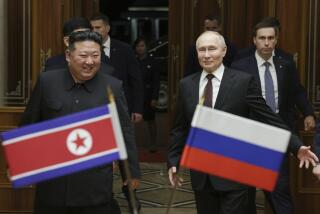Gorbachev, S. Korea’s Roh to Confer in San Francisco
- Share via
WASHINGTON — In an unprecedented event that will dramatize the far-reaching changes taking place among the nations of East Asia, Soviet President Mikhail S. Gorbachev will meet with South Korean President Roh Tae Woo in San Francisco, U.S. officials and other sources said Wednesday.
Ever since the division of the Korean Peninsula after World War II, the Soviet Union has served as a military supplier and patron of the North Korean regime of Kim Il Sung, while South Korea has remained a close ally of the United States.
“This is an extraordinary event,” observed one exultant U.S. official Wednesday. “Can you see the poor guy in Pyongyang who draws the short straw and has to tell the old man (North Korean leader Kim) about this?”
Kim met with Gorbachev in Moscow in 1986. The Soviets have no diplomatic relations with South Korea, and the heads of state of the two nations have never met.
Although the session has not yet been officially announced by the two countries, the U.S. officials and other sources Wednesday confirmed it. Both leaders are scheduled to arrive in the Bay Area on Sunday. South Korean officials had been suggesting since April that Roh might come to the United States to see Gorbachev either before or after the Soviet leader’s summit meeting with President Bush.
Gorbachev’s meeting with Roh would be the culmination of a series of steps that the Soviet Union has taken over the last year to improve relations with South Korea. The two countries opened trade and consular offices last year, and in March, Gorbachev met in Moscow with Kim Young Sam, one of the leaders of South Korea’s ruling Democratic Liberal Party.
North Korea has reacted furiously to the unfolding development of ties.
“The Soviet Union, a friend of our people, must not go to the length of becoming a friend of the enemy of our people,” warned the official North Korean news agency after Gorbachev met with Kim Young Sam.
The Soviet Union’s primary motivation is economic--to attract the capital, technology, labor and other help that South Korea might provide.
“The South Koreans could be important to the development of Siberia,” said Ralph N. Clough of Johns Hopkins University School of Advanced International Studies. “For example, the South Koreans are strong in construction. Their workers have been all over the Middle East and they could work on construction projects for the Soviets. The South Koreans have less expensive consumer goods than the Japanese, too.”
Further, other experts say, Gorbachev may be seeking to develop ties with Seoul as a way of goading Japan into moving faster in upgrading its own ties with the Soviet Union.
“Gorbachev’s willingness to do this says that while the Soviets still attach some importance to the relationship with North Korea, they have other interests to pursue in South Korea, and may even be applying some pressure on other nations in the region, such as Japan, which may be lagging in the development of Soviet ties,” said Alan D. Romberg, a Korea specialist at the Council on Foreign Relations.
For Roh, the meeting with Gorbachev would represent a major step forward in what is often called his foreign policy of nordpolitik --of improving ties with countries to the north and west, including the Soviet Union, China and Eastern Europe.
Over the last four decades, Kim Il Sung’s Communist regime in Pyongyang has sought to maintain close ties with both the Soviet Union and China, apparently in an effort to avoid too great a dependence on either one of its huge neighbors. Over the last year, North Korea has drawn much closer to China, and Gorbachev’s meeting with the South Korean president could further this process.
Experts say that the two leaders will meet in the United States because ties between Moscow and Seoul have not yet advanced to the point where Gorbachev could stop to see Roh in Seoul. “I don’t think they’re quite at the stage yet where they could have presidential visits back and forth. They don’t have diplomatic ties yet,” Clough said. But he said it is possible that South Korea and the Soviet Union could establish diplomatic relations by the end of this year.
More to Read
Sign up for Essential California
The most important California stories and recommendations in your inbox every morning.
You may occasionally receive promotional content from the Los Angeles Times.













